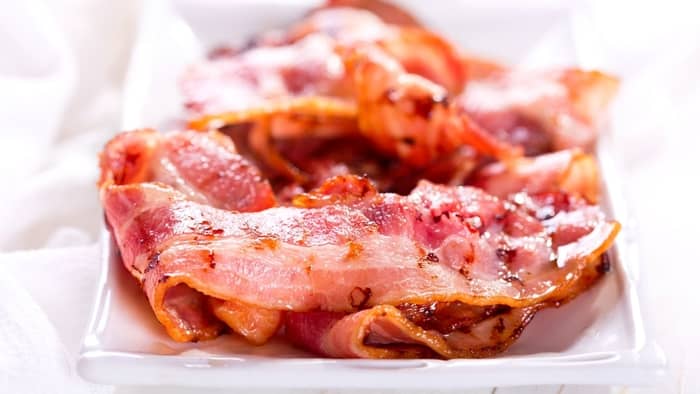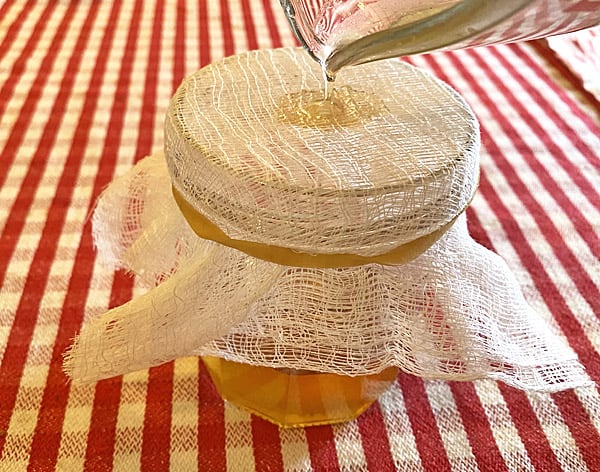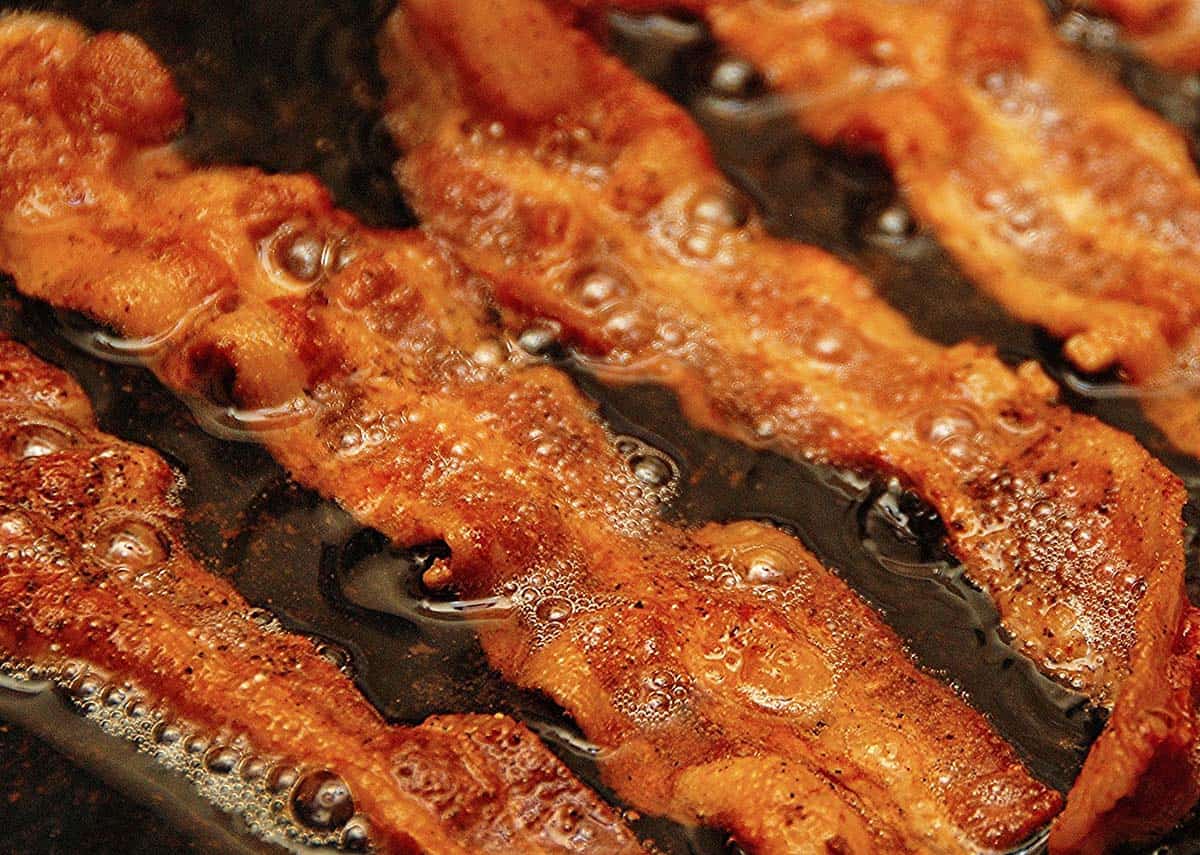People often ask us at BENSA what to do with the bacon grease that comes out of cooking our favorite meat. Our bacon loving members wonder if it’s okay to cook with bacon fat.
They ask us how to store it, what the best container is, and how to get rid of it quickly. And of course, we love sharing all the ways to enjoy bacon fat in cooking and baking.
We love the bacon fat that’s left over after cooking bacon so much that we put together lists of the best bacon fat recipes and 25 ways to use bacon fat.
So today, we’re happy to tackle the topic of bacon grease and answer your questions definitively.
The debate between bacon fat and butter has been ongoing for years. Many people wonder which one is the healthier option for cooking and eating. In this article, we’ll analyze the nutritional profiles of bacon fat versus butter to help you determine which is better for your health.
Overview of Bacon Fat and Butter
Bacon fat is the rendered fat from pork bacon. It has a smoky, salty umami flavor that makes it popular for cooking certain dishes. Butter is a dairy product made from churning cream. It has a creamy texture and mild flavor that works well in baked goods and for spreading on breads.
Nutritionally speaking both bacon fat and butter contain a blend of saturated and unsaturated fats. They’re also high in calories and contain cholesterol. However they differ in some vitamins, minerals, and specific types of fats.
Saturated Fat Content
One of the biggest nutritional differences between bacon fat and butter is their saturated fat content.
Saturated fats are linked to increased cholesterol levels and heart disease risk when consumed in excess The American Heart Association recommends limiting saturated fat intake to 5-6% of total daily calories
-
Bacon fat contains around 5.6 grams of saturated fat per tablespoon.
-
Butter contains around 7 grams of saturated fat per tablespoon.
So gram for gram, butter contains more saturated fat than bacon grease.
However, both should be consumed in moderation as part of a healthy diet. Replacing saturated fats with unsaturated fats from oils, nuts, seeds and fatty fish is recommended for heart health.
Cholesterol Content
In addition to saturated fat, dietary cholesterol also impacts blood cholesterol levels.
The daily recommended limit for cholesterol intake is 300 mg.
-
Bacon fat contains around 15 mg of cholesterol per tablespoon.
-
Butter contains around 30 mg of cholesterol per tablespoon.
Once again, butter contains nearly twice as much cholesterol as bacon fat.
High cholesterol foods like butter and bacon fat should be limited in the diet. However, cholesterol from food has less of an impact on blood cholesterol than saturated and trans fats.
Mono and Polyunsaturated Fats
While saturated fat is undesirable, monounsaturated and polyunsaturated fats have heart-health benefits. They help reduce LDL (bad) cholesterol levels while maintaining HDL (good) cholesterol.
-
Bacon fat is high in monounsaturated fat, with 5 grams per tablespoon. Monounsaturated fats are also found in olive oil and avocados.
-
Butter is low in monounsaturated fat, with just 2.5 grams per tablespoon.
-
Bacon fat also contains polyunsaturated omega-6 fats while butter does not.
The mono and polyunsaturated fats in bacon fat give it a heart-health advantage over butter. However, both should be used sparingly.
Vitamins and Minerals
Bacon fat and butter provide small amounts of certain vitamins and minerals.
Butter contains more vitamins than bacon fat. For example, a tablespoon of butter provides 11% of the RDI for Vitamin A and 2% for riboflavin. Bacon fat does not contain significant amounts of vitamins.
However, butter’s vitamin content declines when it’s cooked. So the values are lower when using butter in recipes.
Neither butter nor bacon fat are significant sources of minerals. Butter contains traces of calcium, phosphorus and selenium.
Overall, butter’s vitamin content gives it a slight edge – but it shouldn’t be relied on as a major source of vitamins in the diet.
Smoke Point Comparison
The smoke point of a fat is the temperature at which it starts burning and smoking. This is important to consider when cooking.
Butter’s smoke point is 350°F when clarified and 250-300°F normally. Meanwhile, bacon fat’s smoke point is 375-400°F.
The higher smoke point makes bacon fat more versatile for sautéing or frying at higher heats. Butter can burn faster at high temperatures.
However, grass-fed butter and ghee (clarified butter) have slightly higher smoke points than regular butter.
Taste Comparison
When it comes to taste and flavor, bacon fat and butter are quite different:
- Bacon fat has a smoky, fatty, umami taste from the cured pork. Butter has a creamy, subtle flavor.
- Butter’s mild taste makes it versatile in cooking and baking. Bacon fat’s strong flavor limits its uses.
- Bacon fat can overpower more delicate foods. Its taste is best suited to hearty dishes.
- The sodium in bacon fat enhances its flavor. Butter doesn’t contain added sodium.
- When a smoky, pork flavor is desired, bacon fat has the advantage over butter.
So in terms of taste, it depends on the desired flavor in a particular recipe or dish.
Uses in Cooking
Bacon fat and butter each serve unique purposes in cooking:
-
Butter is ideal for baking items like cookies, cakes, pie crusts and pastries. The water in bacon fat prevents it from making flaky baked goods.
-
Butter also works well for making roux, bechamel sauces and hollandaise sauce. And it’s perfect spread on breads and biscuits.
-
Bacon fat excels at sautéing vegetables like kale, spinach, brussels sprouts or green beans. It adds flavor that butter cannot.
-
The high smoke point of bacon fat makes it ideal for frying eggs, potatoes or chicken.
-
Adding a bit of bacon fat to beans, soups or chili provides a flavor boost.
-
Bacon fat can be used for roasted vegetables to provide a smoky note.
Healthfulness – The Winner Is…
Overall, when consumed in moderation, both bacon fat and butter can have a place in a healthy diet. However, the health advantages lean in favor of bacon fat:
-
Bacon fat is lower in saturated fat and cholesterol than butter. It also contains mono and polyunsaturated fats.
-
The higher smoke point provides more cooking versatility.
-
Butter provides more vitamins, but they decline when cooking.
-
While high in calories and fat, bacon fat adds lots of flavor with small amounts.
Of course, neither should be consumed in large amounts or on a regular basis. But when used as a cooking fat occasionally, bacon fat is likely the healthier choice.
So in answer to “is bacon fat healthier than butter?”, the evidence points to yes – but only slightly. Both should be used sparingly as part of an overall balanced diet.
When it comes to taste, butter has the advantage for baking and spreading. But for sautéing, frying and adding flavor, bacon fat can’t be beat. So consider the uses and flavors you desire when deciding between butter vs. bacon fat in recipes.
At the end of the day, it comes down to personal dietary needs and preferences. If in doubt, consult your doctor or dietitian about which option is healthiest for your individual diet. But when used in moderation, both bacon fat and butter can have a place in home cooking.

How to Save Bacon Grease
First, cool the drippings in the pan to room temperature. To get rid of any bits in the bacon grease, pour it into a container with a lid and strain it through two layers of cheesecloth or a fine mesh strainer.
It will taste better and last longer if the fat is clear and pure.

Tightly cover your container and keep it in the refrigerator. Spread it on spinach or greens, mix it into cornbread, add it to refried beans, or use it to make Soft Ginger Butter Bacon Fat Cookies.
You can also make Bacon Grease Gravy and use it season a cast iron pan.
Covered and strained bacon fat can be kept in the fridge for a few months or frozen for six months. For detailed storage tips, check out “How Long Does Bacon Fat Last?“.
Bacon Grease vs. Butter

“Is bacon grease better than butter?” or “Can I use bacon grease instead of butter?” are two questions that you might have.
Nutritionally speaking, bacon fat is actually lower in saturated fat and higher in the good monounsaturated and polyunsaturated fats than butter.
According to the USDA, a tablespoon of unsalted butter has 102 calories, 12 grams of fat and 2 miligrams of sodium; salted butter has 90 miligrams of sodium.
A tablespoon of bacon fat, on the other hand, has 115. 7 calories, 12. 8 grams of fat and 19. 4 miligrams of sodium.
So if you’re watching your sodium intake, bacon grease is actually the lower sodium alternative to salted butter. Unsalted butter would be the lowest-sodium choice.
We sometimes substitute bacon fat for half of the butter in a recipe, with excellent results.
Bacon Grease: Better Than Butter?!
FAQ
Is bacon fat a healthy fat?
Is bacon fat a good substitute for butter?
Is bacon grease healthier than olive oil?
Is Bacon a healthy fat?
This is the same fatty acid that olive oil is praised for and generally considered “heart-healthy” ( 1 ). Then about 40% is saturated fat, accompanied by a decent amount of cholesterol. The remaining fat in bacon is 40% saturated and 10% polyunsaturated, accompanied by a decent amount of cholesterol.
Is butter a healthy food?
It depends on the dose. Butter is rich in butirato, a short chain fatty acid (AGCC) that benefits the health of the intestine. But if consumed in excess can lead to weight gain as it is a very caloric food.
Is Bacon the healthiest food?
“Sure, bacon isn’t the healthiest food out there, but that doesn’t mean you can’t enjoy it from time to time,” says EatingWell senior digital editor, Victoria Seaver, M.S., RD. “Plus, there are some upsides to bacon—a single 1-ounce slice delivers 4 grams of protein, which can help you to feel more satisfied after a meal.
Can Bacon be part of a healthy diet?
Yes, bacon can be part of a healthy diet. Here’s how to use the flavorful ingredient in your cooking. It’s hard to deny that bacon possesses magical qualities. Bacon gets people out of bed in the morning, turns basic dishes into flavorful favorites and gives new life to classic recipes.
